The Vaccine Data They Didn't Want Us to Have
When science has been hijacked by Big Pharma and billionaires, people-led research is where it's at!
Written by World Council for Health Correspondent Alice Ashwell, PhD.
World Council for Health (WCH) Steering Committee member Christof Plothe, DO hosted Better Way Live on Monday 13 November 2023. Diny Fielder-van Kleeff gave an update on recent developments with Vaccine Control Group’s database and Shabnam Palesa Mohamed presented an overview of South Africa’s Vaccine Adverse Events Reporting System (SA VAERS).
If you missed it, you can rewatch this inspiring session on our website.
“People-led research … is the future of research in a world where science has gone rogue.” — Dr Tess Lawrie, World Council for Health, 13 November 2023
Vaccine Control Group: An Update and Invitation
Watch Diny’s full presentation on our website.
In 2021, those promoting the mass rollout of Covid-19 injections warned that the ‘unvaccinated’ would be at great risk of dying from Covid. However, no official study was set up to compare the health outcomes of this group with those of the ‘vaccinated’.
In her presentation, Diny Fielder-van Kleeff, co-founder of the Control Group, updated viewers on the progress of this ongoing independent, worldwide health outcome study. Established two years ago to track the health outcomes of those not injected against Covid-19, it has since expanded to include those who received the injections.
What motivated Diny and her husband to undertake this project, having never done anything like this before?
As Diny explains, she needed to do something to keep her children safe:
Introducing the Control Group — Version 2
Diny took us through the newly designed Version 2 of the Control Group’s reporting system that launched in September 2023. The database has expanded greatly over the past two years, and the system has been redesigned by a talented development team thanks to funding provided by participants. It is now much easier to use, more detailed, better categorised, and easier to query. All records are anonymised and encrypted and the system is extremely secure, as it has been developed entirely by their in-house team, one of whom is an expert in data security.
The database includes around 1,500 different health conditions, as well as treatments taken to keep well or get better. Some other categories of information include body type, blood group, allergies, supplements, medications, Covid tests taken, dates of Covid infections, treatments for Covid, and even jobs lost.
In addition to recording the type and number of Covid shots taken, the database now also includes a category for any other vaccines taken. There is also a category for vaccine injuries and a place for people to indicate if they feel that a health condition may be related to one of the vaccines they have received. Diny demonstrated this by querying possible contributors to fibromyalgia and finding that some participants had listed their concerns about the Hepatitis B vaccine.
A Tool for Analysis
The database makes the data easy to visualise with features like heat maps and geographical distributions.
However, Diny made it clear that the Control Group is not responsible for analysing the data they collate. They are building an analytics dashboard that researchers can use to investigate possible relationships between vaccines and health conditions. A ‘light’ version will also be available for the general public who may wish to search for information on, for instance, treatments for various health conditions. Furthermore, the Control Group intends to publish insights based on the data every three months, starting in December 2023.
While the second version of the database is very new and contains relatively small amounts of data, patterns are already emerging. For example:
Of those women who reported that their periods had returned after menopause, all but one believed that this was due to vaccine shedding by those who had been injected.
Comparing heat maps of the vaccinated and unvaccinated revealed that people who had taken a Covid-19 jab relied more on pharmaceutical drugs than the unvaccinated did.
Australia and New Zealand have suffered extremely high job losses since 2020.
You’re Invited to Join
The Control Group website invites us to “join this worldwide, independent health-outcome study and shape the future of wellbeing.”
The more people who sign up and regularly share their experiences, the richer this grassroots dataset will become.
Indeed, this remarkable open-source database of vaccine-related health information has the potential to expand to track the impacts of a much wider range of pharmaceuticals and expose the fraud perpetuated by the for-profit medical establishment.
South African Vaccine Injury Data: An Update with Shabnam Palesa Mohamed
Watch Shabnam’s full presentation on our website.
The South African Vaccine Adverse Events Reporting System (SA VAERS) is an independent, voluntary reporting system for vaccine injuries coordinated by the non-profit company Transformative Health Justice (THJ).
SA VAERS aims to inform people of harms related to vaccination and to help victims and their families access advice and compensation for their losses. To this end, SA VAERS provides reporting forms, counselling support, and compensation advice; and is involved in advocacy, including interviews, events, presentations, and the production of pamphlets and posters. Since witnessing the impact of the Covid-19 shots, SA VAERS has also begun collecting reports on all injection products approved, marketed, and administered in South Africa.
Through her involvement in SA VAERS and the ‘Stop the Shots’ court case, Shabnam has discovered a number of issues relating to vaccination in South Africa, including children being unlawfully injected prior to regulatory approval of the Covid-19 shots for children; pregnant women being injected, resulting in premature and stillbirths; a child being vaccinated against measles in contravention of the consent form signed by the parent; and citizens battling to get compensation for vaccine injuries from the South African government. She has been shining a light on these and other stories through interviews on Good Morning CHD and by working through THJ and SA VAERS to find justice for those affected.
SA VAERS Data Update
Shabnam gave a brief introduction to the SA VAERS website, which lists the most common adverse physical and mental health effects of the Covid-19 shot, and the most dangerous vaccine batches. She also presented a summary of data received from respondents who had completed the updated VAERS reporting form.
This revealed that by 13 November 2023 there had been:
a total of 1,378 reports submitted, with ages ranging from 11 to 95 years.
116 deaths after the shots (8.4% of reports), with 27% of deaths occurring within 14 days and ages ranging between 19 and 95 years.
8,658 negative physical effects, averaging six per person.
1,595 negative mental effects.
As the graphs below illustrate, the great majority of reports were received from three of South Africa’s nine provinces: Gauteng, KwaZulu-Natal, and the Western Cape. In South Africa, the two Covid-19 injections administered were produced by Johnson & Johnson (25%) and Pfizer (75%). The percentage of adverse event reports per province closely reflected the proportion of shots administered.
Among the reports submitted, significantly more females than males experienced adverse effects, with 70% of physical effects, and 68% of mental effects reported. Most adverse events occurred in the 30-59 age group. The 17 children who experienced negative effects from the shots suffered a total of 100 negative effects—or an average of six per child. By the time their reports were submitted, they had lost a total of 134 days of school and normal life. Sadly, some of them may never fully recover.
The socioeconomic impact of adverse reactions to the Covid shots in South Africa is of concern, considering the country’s extremely high overall unemployment rate of 32% and youth unemployment of 60%. Of the reports submitted between 28 March 2021 and 13 November 2023, females accounted for 67% of days lost, being off work for an average of 34 days. This equates to a total of 48 work-years lost and an average income loss of nearly R20,000 per person. Considering that South Africa’s average monthly income is about R12,600, this is a significant sum.
SA VAERS – Going Beyond the Numbers
The South African government, like most governments around the world, has ignored the plight of the vaccine injured, with only three people having received compensation to date from the taxpayer-funded no-fault compensation scheme. The government has also ignored a Promotion of Access to Information Act (PAIA) request for information on adverse effects and compensation.
SA VAERS has produced flyers to assist members of the public in applying for compensation. They are also involved in the ‘Stop the Shots’ court case and are looking for vaccine injury lawyers and mediators to work with them to assist people to apply for compensation or submit civil claims.
Current Activities and Future Plans
In addition to the many activities mentioned above, Shabnam shared some of their future plans, including:
Growing the peer-to-peer vaccine injury support group
Connecting the vaccine injured with doctors and lawyers
Assisting people with their compensation claims
Assisting medical professionals to report to SA VAERS
Doing more local and global presentations
Advocating for the government to protect the people
Translating the website and educational materials into more South African languages
Shabnam encouraged people to continue submitting reports to SA VAERS and to support its work through donations and following its activities on the website, Telegram, and Rumble.
Most appropriately, in acknowledging our guests’ wonderful work, Christof reminded us of the words of Nelson Mandela, spoken during his inaugural address as President of South Africa:
“We understand it still that there is no easy road to freedom.
We know it well that none of us acting alone can achieve success.
We must therefore act together as a united people, for national reconciliation, for nation building, for the birth of a new world.
Let there be justice for all.
Let there be peace for all.
Let there be work, bread, water, and salt for all.
Let each know that for each the body, the mind and the soul have been freed to fulfil themselves.
Never, never, and never again shall it be that this beautiful land will again experience the oppression of one by another ...
Let freedom reign.”
— Nelson Mandela, 10 May 1994
Related content on WCH Substack:
If you find value in this Substack and have the means, please consider making a contribution to support the World Council for Health. Thank you.




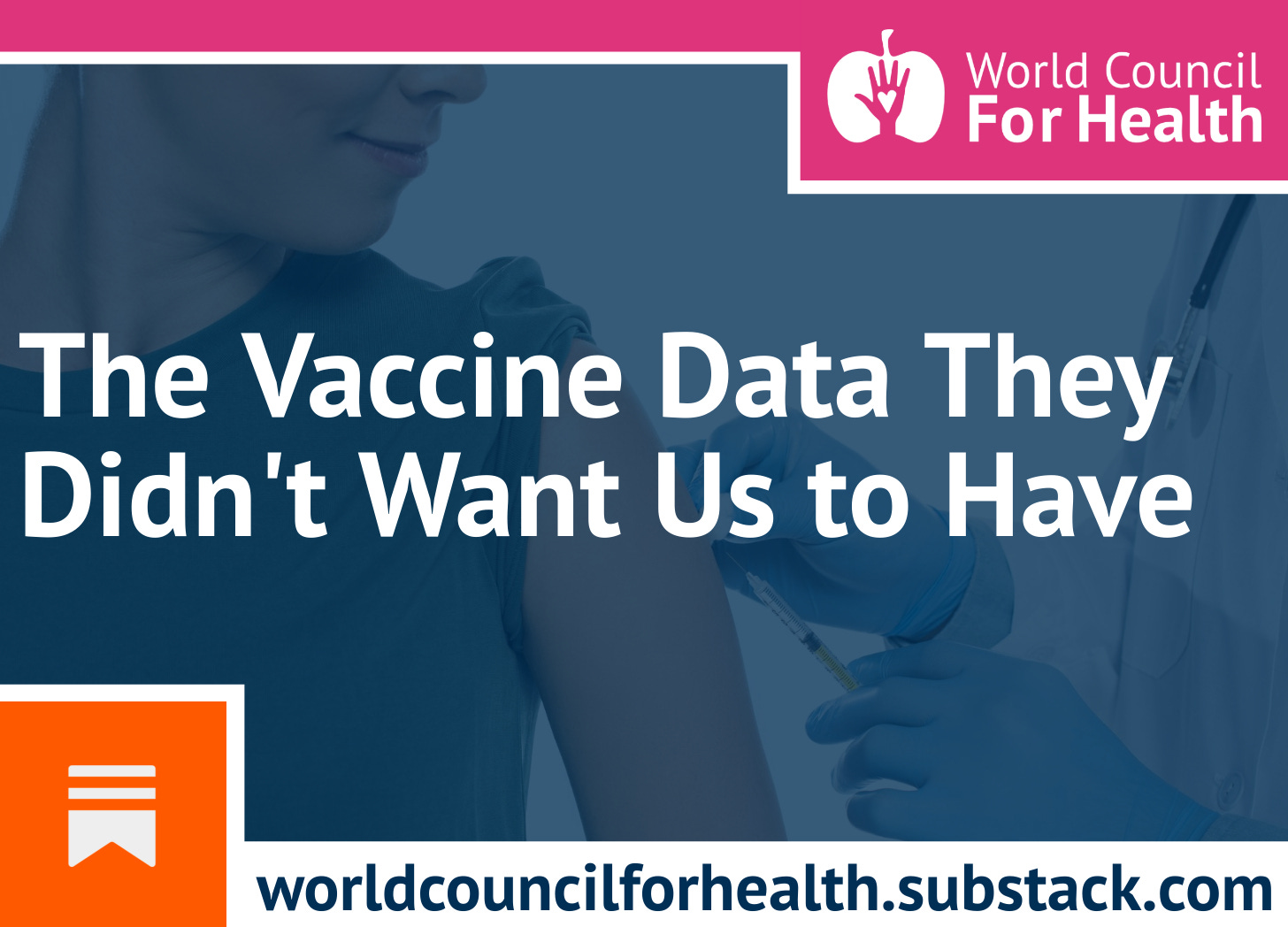
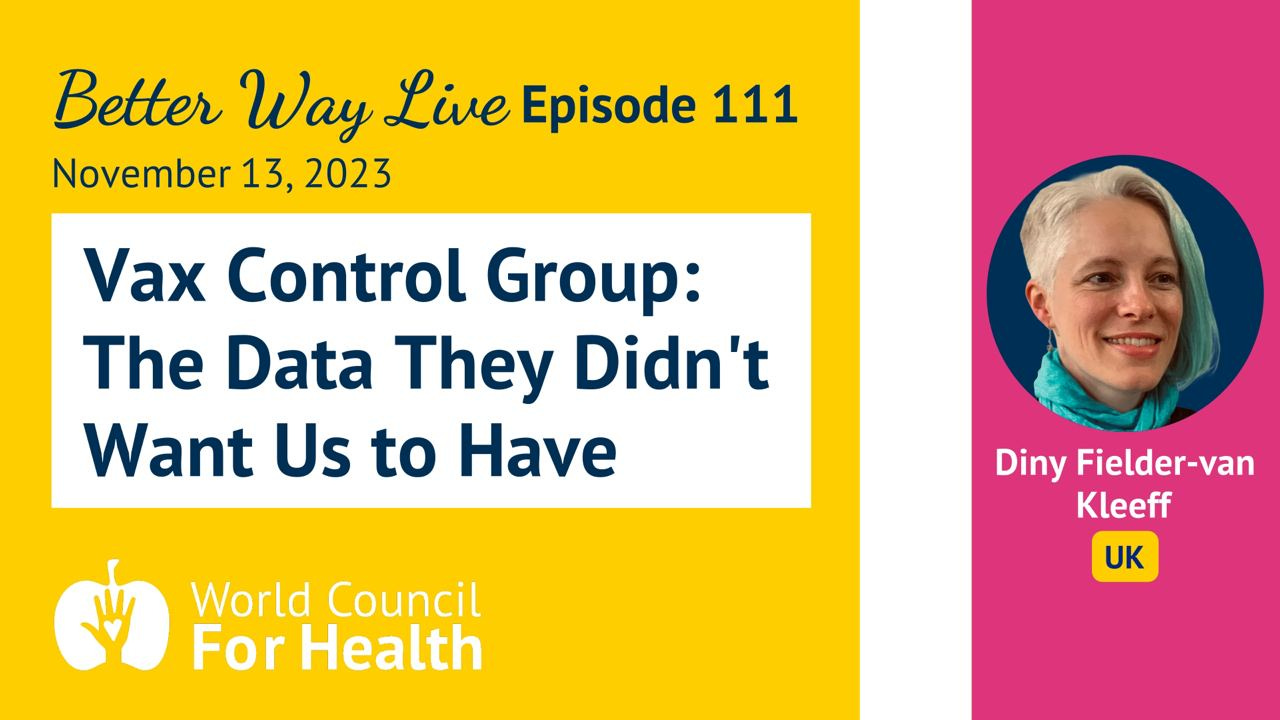
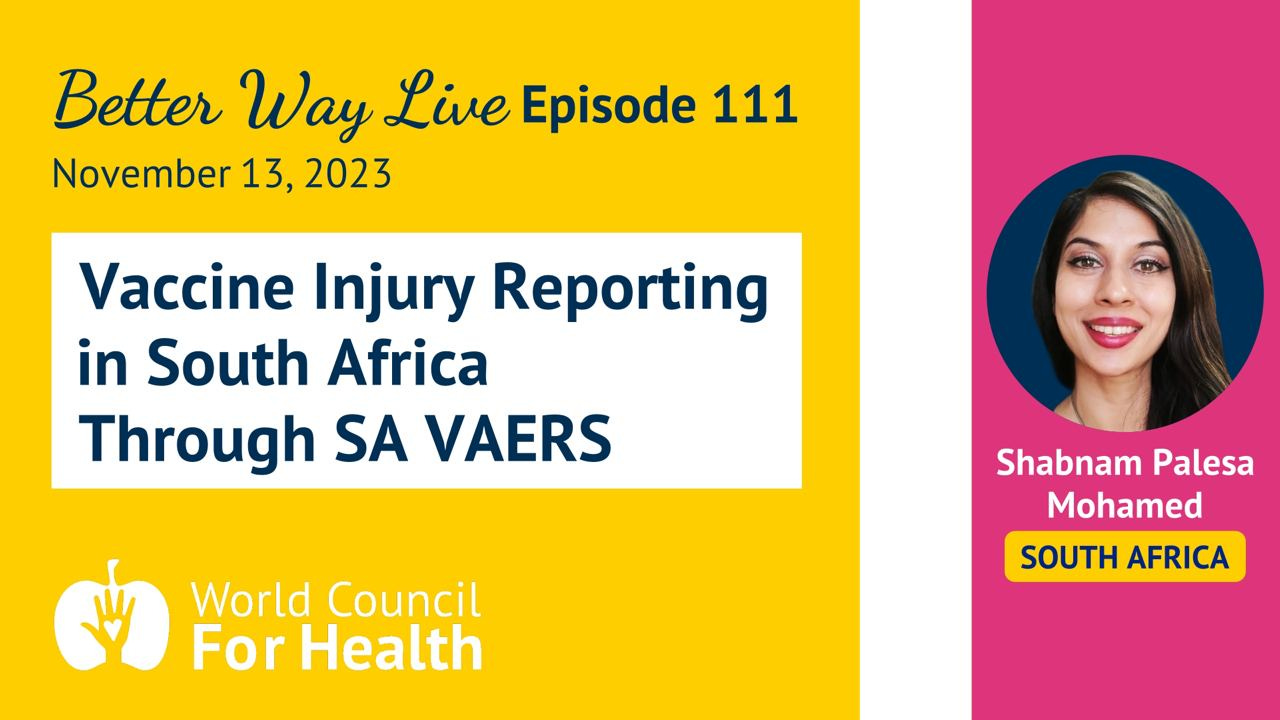
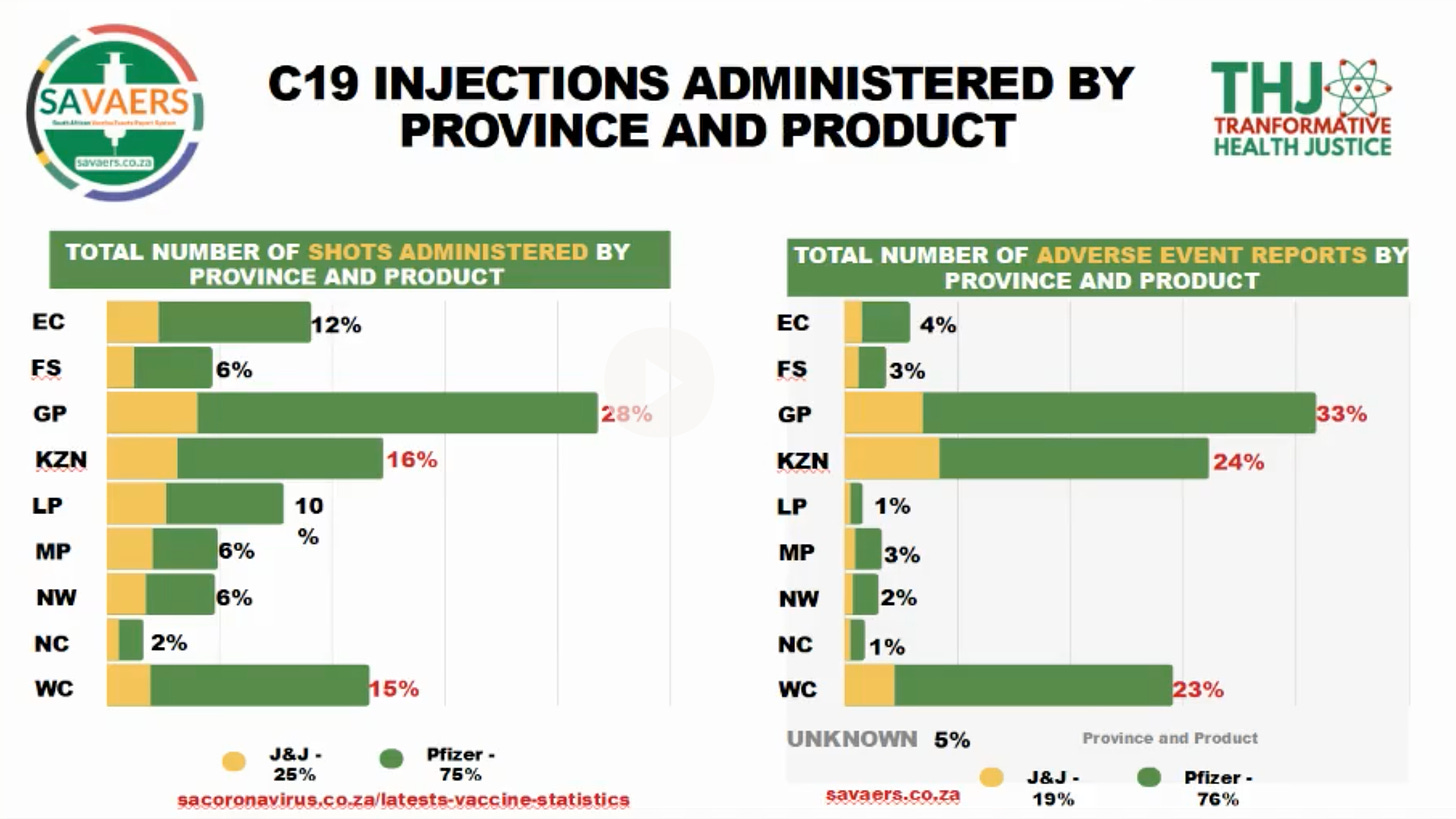
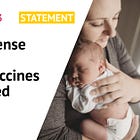
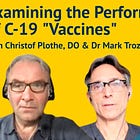
So grateful for this study group! I joined right away when I saw this and have been faithfully reporting every month!
Please approach the Control group organisers to add a dead-man-switch to their data set.
A checkbox that the user must re-check at least every 6 months or so to indicate that they are still alive. Otherwise their status must be listed as unknown after say 30 days until they check the check box again.
Also they might be able an app to indicate that the user is still making use of their cellphone and when they fall silent they could flag it as such. Alternately a couple could mutually agree to update their spouses details if one passes away for any reason.
Without this information the mortality data will be very hard to use as an end user will not indicate death.
=====
EDIT:
-----
I had a look an at least one part of this is already implemented with a monthly reminder. That is great. The health card may be a way for someone to indicate that the participant has potentially passed away and the reason for this, this information could obviously be corrected if the participant logs in and is in fact alive.